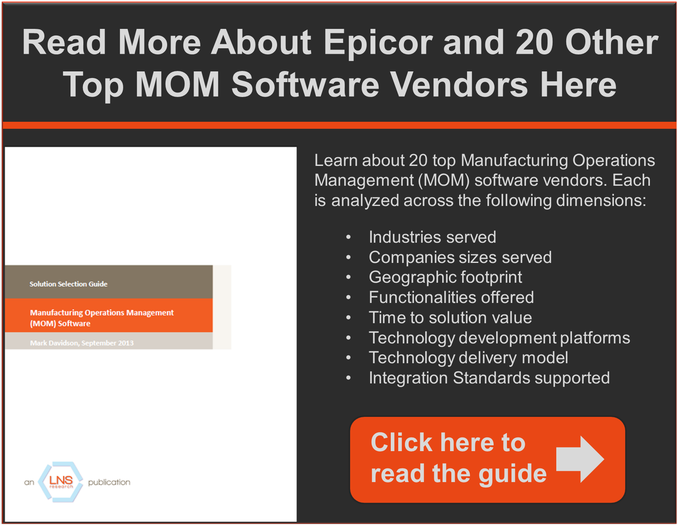The manufacturing industries face unprecedented levels of competition driven by many external and internal business forces. Customer demands have never been higher, supply chains have become increasingly complex, production facilities are becoming ever-more spread across the globe - subject to local laws, regulations, differences in culture - and at the same time, there is an exponential generation of data coming from intelligent sources and disparate systems that needs to be sorted through.
One of the ways companies have been striving toward increased customer responsiveness, improved data analysis capabilities, and real-time visibility is through advancements in technology, particularly the use of Manufacturing Operations Management (MOM) software solutions. MOM software applications play a critical role in connecting shop-floor activities, automation systems and equipment, to the overall business reporting software. And our research shows companies that have implemented MOM applications in some form have better visibility into operations and a more agile response rate to changing demands than those that haven't.
As the MOM space has grown and matured inside the past decade, companies are increasingly taking advantage of the benefits offered, choosing to implement modular solution applications or comprehensive integrated suites depending on their needs. In order to educate potential customers in this area, LNS Research has recently released its MOM Solution Selection Guide, which is based on briefings with 20 of the top vendors in the space. Each week, we’ve been covering a different vendor.
This week, we’re looking at Epicor, a California-based company offering both MOM and ERP software solutions.
An Overview of Epicor’s Mattec MES, Informance EMI, and Solarsoft Software Capabilities
Best known as a supplier of flexible enterprise software to many mid-market corporations, Epicor has grown in both its MOM and manufacturing ERP capabilities through several strategic acquisitions, including Solarsoft and Informance EMI. These acquisitions have put the company in a good position for production companies looking for either standalone manufacturing solutions or integrated business and manufacturing solutions.
The company’s Mattec Manufacturing Execution System (MES) solution is well-suited to maximize the production of existing assets in discrete assembly and repetitive manufacturing operations. With the acquisition of Solarsoft in 2012 the company gained additional ERP capabilities, which are leveraged by industries such as paper/lumber/timber, automotive, and packaging. Additionally, Epicor’s Tropos process manufacturing software adds new coverage in the food, beverage, metals and mining, and pharmaceuticals industries.
The acquisition of Informance Enterprise Manufacturing Intelligence (EMI) added the ability to integrate across multiple existing systems and data sources at the plant or enterprise level, offering over 700 out-of-the-box analytics and dashboards for manufacturers to use, and is a good fit across a broad set of manufacturing industries. With capabilities in both the business and manufacturing side, Epicor is able to help customers understand the business/financial impact of manufacturing metrics in real time.
Epicor’s focus on helping customers achieve success with the lowest possible overhead software solution is an interesting perspective LNS Research has not seen often in the ERP supplier community. The company is also investing in improving the out-of-the-box integration between its MOM and ERP offerings. Though its stated time to solution implementation value and ROI is already impressive, in the future we hope to see Epicor invest in a common technology platform that fully meets our vision of a next generation MOM integration and collaboration platform and modular “apps.”
Epicor’s MOM Software Solution Capabilities: A Closer Look
For a more detailed look at Epicor’s software, capabilities, strategic positioning, read LNS Research's MOM Solution Selection Guide. It examines the MOM vendor landscape based on criteria such as specific functionalities, company sizes served, industry strengths, geographic footprint, technology delivery models and platforms, and time to solution value. The guide also breaks down Epicor’s core attributes by current and emerging strengths and total coverage areas.
The solution selection guide and its full comparative analysis of 20 of the top MOM software vendors are accessible here.
